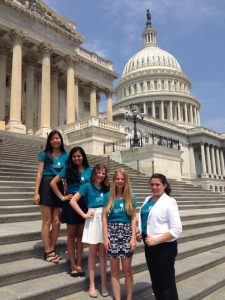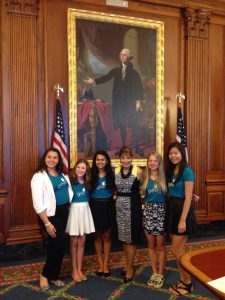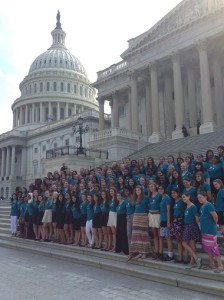I’ve posted about my introduction to Girl Up before, and this week I’ve been fortunate enough to spend three days in Washington at the Girl Up Leadership Summit which was attended by about 170 girls aged between 10 and 19. They are predominantly from the US, but attendees also came from South America, the UK, Malawi and, of course, my own 12-year-old from Australia.

The theme of the summit was Connect, Learn and Lead and those girls sure did plenty of both! Most of the girls knew very few, if any, other attendees and approximately half had no previous exposure to Girl Up, but were drawn by the opportunity to participate in the great program. The first day was all about Developing the Leader in You, with a mix of speakers telling their stories about how they became leaders and the girls participating in workshop activities on planning, communication and connection. They learned how to develop a 30 second elevator pitch, and had to construct one in ten minutes and then deliver it to the eight peers on their table. They learned the eight basic steps of project planning, and had to put those into action planning an activity for International Day of the Girl. They learned how to communicate succinctly and clearly, introducing themselves with a firm handshake while making eye contact. All of this was done in a fun, safe environment and the girls absolutely loved it and embraced each activity with energy and enthusiasm. No-one spent the day playing on their phone and you could have heard a pin drop as they listened with full attention to the varied speakers, all whom gave the girls real lessons that they could take away, identify with and learn from.  Monique Coleman, actress and Girl Up Champion, told the girls that uplifting and inspiring others to lead was an important part of leadership and challenged them with the thought that it doesn’t matter who thinks you are a leader if you don’t believe it yourself.
Monique Coleman, actress and Girl Up Champion, told the girls that uplifting and inspiring others to lead was an important part of leadership and challenged them with the thought that it doesn’t matter who thinks you are a leader if you don’t believe it yourself.
Angelica Fuentes, CEO of Omnilife, spoke of the challenges of growing up as a girl in the traditional values of a Mexican family and told them that their position of privilege must serve as the catalyst for action on behalf of girls who are less fortunate. She also reminded them of the need to shine brightly, as dimming your own light does not help anyone.
Ingrid Vanderveldt, who has taken on the mission of empowering one billion (yes that’s billion with a B) women by 2020, shared her very personal story of the challenges she faced growing up, and talked to the girls about the importance of finding their support network; those friends and colleagues who will have their back and be there to support them. She also told them they needed to get comfortable being uncomfortable (one of my personal favourite mantras!) as that was the only way to achieve anything great. Sean Robinson, co-host of Access Hollywood, shared her approach of when told she couldn’t do something, just saying “OK”and doing it anyway and the wise words of her father who ended her pity party by telling her that a setback was just a setup for a comeback! Despite the pleas of the girls, the one thing she didn’t share was any of the dirt on any of the multiple celebrities she had interviewed…
Amy Robach, anchor of Good Morning America, spoke about the power of telling a story in a way that can see its message change people’s lives, and the experience of her own story becoming the biggest story of her career when an on-air mammogram delivered a breast cancer diagnosis.
Anne Fulenwider, Editor in Chief of Marie Claire wrapped up the first day with her top ten leadership tips, which included such gems as:remaining curious all your life as there is always something new to learn and actively seeking out the things that scare you and doing them.
So many of these valuable messages bear a striking similarity to the ones that are prevalent in the womens’ leadership events I attend. It’s incredibly powerful that these girls are hearing the messages at a much younger age and will grow up seeking out situations that challenge them, believing that they have every right to represent themselves confidently and embracing and believing in their leadership potential.
Day two was all about educating the girls on the challenges that girls in developing countries face and reinforcing the need for them to act to assist them. The incredible Memory Banda, a 14-year-old from Malawi, spoke with amazing eloquence and power on the work she is doing in her community with the assistance of the leadership training provided to her by Girls Empowerment Network GENET to end child marriages and allow girls to continue their education.
All of this was preparation for the final part of the sessions, where the girls participated in advocacy training in preparation for their Lobby day on Capitol Hill the following day. They would be lobbying for co-sponsorship of bill HR 3398, the Girls Count Act. With many developing countries not accounting for the number of girls in their population through birth registrations or other official forms of identification, girls can find it difficult to go to school, get a job or a loan or own property. It also places them at increased risk of child marriage and human trafficking. The Girls Count bill encourages the promotion of birth certifications and identity documentation by supporting and training governments and local organisations in developing countries on this issue.
The final day of the summit saw the girls arrive at Capitol Hill, where they broke up into geographical based teams (Sascha was an honorary Californian for the day!) and met with as many Members of Congress and Senators as they possible could to lobby their cause. They put the training of the past couple of days into great use as they presented their case clearly and eloquently, and despite the extreme heat and humidity, never faltered from the task. Our group covered over eight kilometres; racing from one building to another to squeeze in as many meetings as possible. None of the girls ever complained or asked to slow down; they were all very focused on their goal of delivering their message and gaining as much support as they could.



This week has highlighted even more clearly the enormously important role our girls will play in delivering real change to the world, and that age truly is no barrier for being able to get out and make a difference. The Girl Up program provides an incredible platform for girls who want to make a difference and develop leadership skills while doing so, and you can find out more at www.girlup.org.